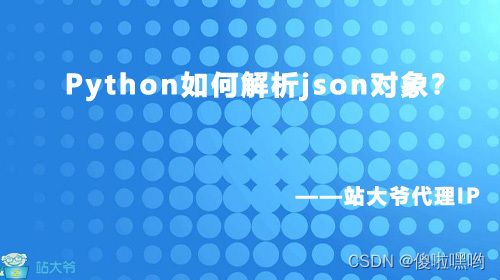Python如何解析json对象?
目录
一、JSON简介
二、Python的json模块
1. 加载JSON数据
2. 生成JSON数据
三、处理复杂的JSON数据
四、自定义JSON解析器
五、注意事项和最佳实践
六、总结
JSON(JavaScript Object Notation)作为一种轻量级的数据交换格式,在网络通信和数据处理中扮演着重要角色。Python作为一种功能强大且易用的编程语言,提供了内置的json模块来解析和生成JSON数据。在本文中,我们将深入探讨如何在Python中解析JSON对象,并通过实例展示其应用。
一、JSON简介
JSON建立在JavaScript的一个子集之上,采用完全独立于语言的文本格式来存储和表示数据。简洁和清晰的层次结构使得JSON成为理想的数据交换语言。易于人阅读和编写,同时也易于机器解析和生成。
二、Python的json模块
Python的json模块提供了一组函数来处理JSON数据。主要函数包括json.loads(),json.load(),json.dumps()和json.dump()。前两个函数用于解析JSON数据,后两个函数用于生成JSON数据。
1. 加载JSON数据
json.loads()函数用于将一个JSON格式的字符串转换为Python对象。例如:
import json
json_string = '{"name": "John", "age": 30, "city": "New York"}'
python_obj = json.loads(json_string)
print(python_obj) # Output: {'name': 'John', 'age': 30, 'city': 'New York'}而json.load()函数则是从文件对象中读取JSON数据并转换为Python对象。例如:
import json
with open('data.json', 'r') as f:
python_obj = json.load(f)
print(python_obj)
2. 生成JSON数据
json.dumps()函数用于将Python对象转换为JSON格式的字符串。例如:
import json
python_obj = {'name': 'John', 'age': 30, 'city': 'New York'}
json_string = json.dumps(python_obj)
print(json_string) # Output: '{"name": "John", "age": 30, "city": "New York"}'而json.dump()函数则是将Python对象转换为JSON格式并写入到文件对象中。例如:
import json
python_obj = {'name': 'John', 'age': 30, 'city': 'New York'}
with open('data.json', 'w') as f:
json.dump(python_obj, f)三、处理复杂的JSON数据
当处理复杂的JSON数据时,可能会遇到嵌套的JSON对象或数组。Python的json模块同样可以处理这种情况。解析后,可以通过索引或迭代来访问这些数据。
{
"name": "John",
"age": 30,
"contacts": {
"email": "[email protected]",
"phone": "+1234567890"
},
"courses": [
{"name": "Math", "grade": "A"},
{"name": "Science", "grade": "B"}
]
}import json
json_string = '''
{
"name": "John",
"age": 30,
"contacts": {
"email": "[email protected]",
"phone": "+1234567890"
},
"courses": [
{"name": "Math", "grade": "A"},
{"name": "Science", "grade": "B"}
]
}
'''
data = json.loads(json_string)
email = data['contacts']['email']
print(email) # Output: [email protected]四、自定义JSON解析器
在某些情况下,我们可能需要自定义JSON解析器以满足特定需求,比如处理特殊的日期格式。Python的json模块提供了JSONDecoder类来帮助我们实现自定义解析器。
import json
from datetime import datetime
from json.decoder import JSONDecoder
class CustomJSONDecoder(JSONDecoder):
def __init__(self, *args, **kwargs):
super().__init__(*args, **kwargs)
self.parse_date = self.custom_date_parser
def custom_date_parser(self, date_string):
return datetime.strptime(date_string, "%Y-%m-%dT%H:%M:%SZ")
# JSON字符串
json_string = '{"name": "John", "date": "2023-07-29T14:30:00Z"}'
# 使用自定义的JSON解析器
data = json.loads(json_string, cls=CustomJSONDecoder)
# 输出解析后的数据
print(data['name']) # 输出: John
print(data['date']) # 输出: 2023-07-29 14:30:00+00:00五、注意事项和最佳实践
在解析JSON数据时,有一些注意事项和最佳实践需要遵循。例如,应始终验证输入数据的完整性和准确性,避免执行不受信任的来源的JSON数据,以防止可能的注入攻击。此外,为了提高代码的可读性和可维护性,建议将JSON解析和生成代码保持简洁和一致。
六、总结
Python的json模块提供了一种简单有效的方式来解析和生成JSON数据。通过json.loads()和json.load()函数,我们可以轻易地将JSON数据转换为Python对象,以便于进一步的数据处理和分析。
同时,通过json.dumps()和json.dump()函数,我们可以将Python对象转换为JSON格式,以便于数据的存储和传输。在处理复杂的JSON数据时,我们可以通过索引或迭代来访问嵌套的JSON对象和数组。
通过自定义JSON解析器,我们还可以处理特殊的数据格式和需求。在解析和生成JSON数据时,我们还应注意数据的安全性和代码的规范性,以确保程序的稳定和高效。
